Five Proven HVAC Trends for Contractors in 2025
The HVAC industry is evolving rapidly, and contractors need to stay informed about the latest trends to thrive in 2025. Here are five proven trends that you should consider integrating into your business strategy to stay competitive and meet customer demands.
1. Increased Focus on Energy Efficiency
As environmental concerns grow, energy efficiency is becoming a priority for homeowners and businesses alike. In 2025, you will find that customers are more willing to pay for systems that use less energy. Consider offering high-efficiency units and smart thermostats that allow users to manage energy consumption better. The integration of energy-efficient products will not only help your clients save money on utility bills but also improve the sustainability of their properties.
2. Smart Home Integration
The rise of smart homes is another trend shaping the HVAC industry. Home automation systems are increasingly taking center stage, enhancing comfort and convenience for consumers. As a contractor, you should familiarize yourself with smart HVAC systems that can be controlled via mobile applications. Installations of smart thermostats, sensors that monitor air quality, and devices that provide real-time data will set you apart from competitors. By providing options that integrate with popular smart home platforms, you can attract more tech-savvy clients.
3. Enhanced Indoor Air Quality Solutions
Improving indoor air quality (IAQ) is critical for health-conscious consumers, especially in commercial buildings. In 2025, you will likely see an uptick in demand for advanced filtration and ventilation systems that reduce allergens, pollutants, and pathogens. Educating your clients about the benefits of high-efficiency particulate air (HEPA) filters, air purifiers, and UV light systems can make a significant difference. This trend also ties into the energy efficiency discussion, as better IAQ can lead to reduced energy consumption when designed correctly.
4. Sustainability Practices
With climate change at the forefront, sustainability is not just a buzzword; it’s a necessity. More HVAC contractors are adopting sustainable practices by using eco-friendly refrigerants and installing energy-efficient equipment. Emphasizing your commitment to sustainability can help you attract environmentally-conscious consumers. Consider certifications that enhance your credibility, such as being a member of the Green Building Council or obtaining specific sustainability training for you and your team.
5. Emphasis on Customer Experience
In the competitive landscape of HVAC, exceptional customer service can set you apart. In 2025, contractors will need to prioritize communication, transparency, and personalized service. Implementing customer relationship management (CRM) systems can streamline interactions and keep track of customer needs. Online reviews and word-of-mouth recommendations will be even more influential in attracting new business. Make it a point to follow up with clients after installation, address any concerns promptly, and ask for feedback to improve your services.
Beyond these trends, ensure that you’re also aware of new regulations and industry standards that may impact your work. Keeping up-to-date with training workshops and continuing education can help you stay ahead in an ever-changing market.
To sum up, embracing energy efficiency, smart technologies, enhanced indoor air quality solutions, sustainability practices, and a heightened focus on customer experience will position your business well for success in 2025. For more insights on HVAC trends and best practices, you can visit HVAC.com and Energy.gov, which provide excellent resources tailored for contractors.
By acknowledging these trends and adapting your strategies accordingly, you can not only meet the expectations of clients but exceed them, solidifying your reputation as a leading HVAC contractor in 2025.
The Role of Smart Technology in Modern HVAC Systems
The integration of smart technology into HVAC systems has transformed the way contractors approach installation, maintenance, and customer interactions. These advancements have not only increased efficiency but also enhanced user experiences. As you consider updating your HVAC offerings, staying abreast of smart technology trends can position your business for success in a rapidly evolving market.
Smart HVAC systems utilize the Internet of Things (IoT), connecting various components to provide real-time data and facilitate remote monitoring. This connectivity allows homeowners to control their heating, cooling, and ventilation systems via smartphones or voice-activated devices. Not only does this convenience appeal to consumers, but it also enables contractors to offer enhanced services.
Energy Efficiency
Modern HVAC systems equipped with smart technology can significantly reduce energy consumption. Features like programmable thermostats, variable-speed compressors, and energy monitoring help households optimize their usage patterns. Energy Star-rated products are becoming increasingly popular, enabling homeowners to enjoy lower utility bills while contributing to environmental sustainability.
- Programmable Thermostats: Scheduling heating and cooling based on daily routines helps save energy.
- Variable-Speed Compressors: Adjusting the compressor speed based on the specific needs of the environment reduces energy waste.
- Energy Monitoring: Real-time tracking of energy usage aids in identifying areas for improvement.
Improved Indoor Air Quality
Smart HVAC systems do more than just regulate temperature; they also enhance indoor air quality. Advanced filtration systems, humidifiers, and sensors detect and mitigate pollutants, allergens, and humidity levels. This capability is especially critical for allergic individuals or those with respiratory issues.
Aspects of smart technology that impact air quality include:
| Feature | Benefit |
|---|---|
| Smart Filters | Alerts when filters need replacing, ensuring optimal performance. |
| Air Quality Sensors | Provides real-time data about air quality, allowing for timely actions if levels dip. |
| Humidity Control | Maintains an ideal humidity level, preventing mold growth and enhancing comfort. |
Remote Monitoring and Maintenance
Contractors can revolutionize their service offerings through remote monitoring capabilities. Smart HVAC systems enable contractors to receive alerts for potential issues before they escalate into major problems. This proactive maintenance approach not only saves time and money for both contractors and customers, but it also strengthens customer loyalty.
The benefits of remote monitoring include:
- Real-Time Alerts: Immediate notifications of system malfunctions allow timely interventions.
- Predictive Maintenance: Data analytics help anticipate future breakdowns, optimizing service schedules.
- Enhanced Customer Relationships: Providing ongoing support fosters trust and encourages referrals.
Integration with Home Automation Systems
As home automation systems continue to gain traction, so does the need for HVAC systems that can integrate seamlessly with them. Smart HVAC systems are designed to connect with other devices such as lighting, security, and energy management systems, creating a comprehensive smart home ecosystem.
Integrating HVAC with home automation can lead to:
- Improved Comfort: Automated adjustments based on occupancy and environmental factors enhance the living experience.
- Energy Savings: Coordinated systems can optimize energy use across the home.
- Convenience: Unified control through a single app or voice command simplifies daily routines.
Enhancing Customer Education and Engagement
Smart technology plays a crucial role in educating customers about their HVAC systems. Many modern systems come with user-friendly interfaces that provide insights into performance and maintenance needs. By leveraging smart technology, contractors can empower customers with knowledge and create a more engaged client base.
For further reading on smart HVAC solutions, visit HVAC.com or Energy.gov. These resources can help expand your understanding of the integration of smart technology in HVAC systems.
By adopting these innovative technologies and utilizing their benefits, HVAC contractors can not only improve their service efficiency but also enhance customer satisfaction and loyalty in this competitive industry.
Renewable Energy Solutions for HVAC Contractors
As the HVAC industry evolves, contractors are increasingly seeking innovative methods to enhance their service offerings. One of the most significant developments is the integration of renewable energy solutions. Advanced technology and growing consumer interest in sustainable practices have opened doors for HVAC contractors to improve their services. Here are some key renewable energy solutions that can redefine your HVAC business.
Solar Power Integration
Solar energy has become a leading renewable resource for HVAC systems. By integrating solar panels with HVAC equipment, contractors can help homeowners reduce energy costs while promoting a greener environment. Here are essential points regarding solar power integration:
- Photovoltaic Systems: Solar panels convert sunlight into electricity, which can power HVAC systems directly.
- Solar Water Heating: This system uses solar energy to heat water for residential heating or hot water use.
- Incentives and Rebates: Many states offer financial incentives for installing solar energy systems, making it appealing to consumers.
Geothermal Heat Pumps
Geothermal heat pumps utilize the consistent temperature of the earth to provide heating and cooling solutions. This technology is highly efficient and environmentally friendly. Here’s how:**
- Energy Efficiency: Geothermal systems are known to be three to four times more efficient than traditional HVAC systems.
- Low Operating Costs: Although installation costs can be high, geothermal systems lower monthly utility bills over time.
- Longevity: Geothermal heat pumps typically have a longer lifespan compared to conventional systems, reducing the need for replacements.
Smart Thermostats and Energy Management Systems
The rise of smart technology has transformed HVAC systems into more efficient and user-friendly solutions. Smart thermostats and energy management systems allow homeowners to control their energy usage remotely, offering the following benefits:
- Energy Savings: These devices learn user habits to optimize heating and cooling schedules, potentially saving up to 10-15% on energy bills.
- Remote Access: Homeowners can adjust their HVAC systems from anywhere using mobile apps, enhancing convenience.
- Integration with Renewable Energy: Smart systems can work alongside solar panels or energy storage solutions to maximize savings.
Energy Recovery Ventilation (ERV)
Energy recovery ventilation systems improve indoor air quality while minimizing energy loss. These systems recover energy from exhaust air and use it to precondition incoming fresh air. Key aspects include:
- Improved Air Quality: ERV systems filter and circulate fresh air, reducing indoor pollutants and allergens.
- Energy Efficiency: By preconditioning incoming air, they help reduce heating and cooling costs.
- Moisture Control: ERVs balance humidity levels, providing comfort while conserving energy.
Batter Storage Systems
With the growing integration of renewable energy sources, residential battery storage systems have gained popularity. They allow homeowners to store excess energy generated by solar panels for later use. Consider these factors:
- Backup Power: Batteries provide power during outages, ensuring home comfort regardless of external conditions.
- Load Shifting: Homeowners can shift energy usage during peak hours, resulting in lower energy costs.
- Environmental Benefits: By harmonizing with renewable sources, they contribute to lower carbon footprints.
Utilizing these renewable energy solutions not only elevates your HVAC business but plays a crucial role in the transition to sustainable practices. To learn more about renewable energy solutions, check out resources like U.S. Department of Energy – Solar PV Systems Overview and Geothermal Exchange Organization for detailed information on installation and technologies.
As a contractor, being informed about these innovations can help you provide value to your customers. Embracing renewable energy solutions will secure your place in the evolving HVAC landscape and set your business up for future success.
Enhancing Customer Experience Through HVAC Innovations
In the HVAC industry, enhancing customer experience is more critical than ever. With technology evolving rapidly, contractors need to adapt and apply innovative solutions to meet the changing expectations of their customers. By focusing on advancements in home comfort, energy efficiency, and digital engagement, contractors can revolutionize the customer experience in HVAC services.
Smart Thermostats
One of the most significant innovations in recent years is the rise of smart thermostats. These devices offer homeowners precise control over their heating and cooling systems through mobile applications. Benefits include:
- Energy savings by learning user habits
- Remote access for scheduling temperatures
- Integration with other smart home devices
By promoting smart thermostats, contractors can help clients lower energy bills while providing them with convenient features that enhance their comfort.
High-Efficiency Equipment
Investing in high-efficiency HVAC systems is another way to improve customer satisfaction. Modern equipment has been designed to consume less energy while delivering superior heating and cooling. This not only minimizes the environmental impact but also appeals to environmentally conscious consumers. Customers will appreciate:
- Lower utility bills due to higher efficiency ratings
- Reduced maintenance costs with advanced technology
- Peace of mind with reliable, long-lasting systems
Contractors can gain a competitive edge by offering high-efficiency options that align with current energy standards.
Enhanced Installation Techniques
Advanced installation techniques have gained ground, making the process smoother and less disruptive for homeowners. Utilizing innovative tools and technologies such as drones for roof inspections and augmented reality for system planning can streamline the installation process. Benefits of these techniques include:
- Faster project completion rates
- Reduced error margins in installations
- Improved communication with customers throughout the process
By adopting cutting-edge installation methods, contractors can enhance the overall client experience, making it more efficient and less stressful.
Proactive Maintenance Plans
An innovative approach to customer service is implementing proactive maintenance plans. These programs involve regular check-ups and system adjustments that preemptively address potential issues. Key features include:
- Scheduled maintenance reminders, reducing the chance of system failure
- Discounts on services for maintenance program members
- A dedicated hotline for urgent support needs
Proactive maintenance creates a sense of security for customers, knowing that their HVAC systems are being monitored by professionals.
Digital Engagement
Enhancing customer experience through digital engagement tools can set contractors apart in a crowded market. Websites and mobile apps that provide valuable resources can significantly boost customer satisfaction. Features to consider include:
- Easy access to service requests and scheduling
- Educational content about HVAC systems
- Customer feedback systems to tailor services
By leveraging digital solutions, contractors can improve interactions with clients and offer a more personalized experience.
The HVAC industry is transforming as the demand for heightened customer experience grows. By implementing these innovations and maintaining a focus on improving the homeowner’s journey, contractors will not only enhance satisfaction but also foster loyalty and long-term relationships. For more insights and resources related to HVAC advancements, visit HVAC.com or ACHR News.
Strategies for Workforce Development in the HVAC Industry
The HVAC industry is experiencing rapid changes, necessitating new strategies for workforce development. As you adapt to these shifts, focusing on the right areas can help you build a strong, skilled workforce. Here are several effective strategies to implement in the HVAC sector.
Emphasizing Technical Training
One of the most vital aspects of workforce development in HVAC is technical training. Advancements in technology require contractors and technicians to stay educated about new systems and methodologies. Implementing the following training programs can ensure your workforce remains competitive:
- Hands-on training sessions with new equipment.
- Online webinars and virtual training modules.
- Partnerships with HVAC training schools for curriculum support.
- Certification programs focused on newer technologies, such as smart HVAC systems.
Consider collaborating with organizations like the Nexstar Alliance for training resources.
Mentorship and Apprenticeship Programs
Establishing mentorship and apprenticeship programs can significantly benefit both new employees and seasoned technicians. By pairing less experienced team members with veterans, you can foster knowledge sharing and skill development. Here are core strategies to implement:
- Create structured apprenticeship tracks that combine on-the-job training with classroom education.
- Encourage mentorship by providing incentives for experienced employees who guide newcomers.
- Regularly assess the progress of apprentices and offer constructive feedback.
Engaging with associations such as the Air Conditioning Contractors of America (ACCA) can provide additional resources for developing these programs.
Utilizing Technology for Workforce Management
Technology into daily operations can greatly enhance workforce management. Use tools that support productivity, scheduling, and employee engagement. Some effective technology applications include:
- Employee management software to track training progress and certifications.
- Mobile apps for field technicians to streamline job management.
- Solutions for real-time communication and collaboration within teams.
Implementing systems like Service Fusion can vastly improve overall efficiency in managing your workforce.
Fostering a Positive Work Environment
A healthy workplace culture is essential for retaining top talent. Ensure your work environment is welcoming and encouraging. Strategies to enhance employee satisfaction include:
- Regular employee feedback surveys to identify areas for improvement.
- Recognizing achievements through awards or public acknowledgment.
- Offering flexible working arrangements to promote work-life balance.
Choose employee engagement tools like SurveyMonkey to gather insights into your team’s opinions and morale.
Recruiting Diverse Talent
Diversity in the workforce can lead to innovative ideas and solutions in HVAC. Developing strategies to recruit a diverse team can yield significant benefits.
- Partner with community organizations to reach potential candidates.
- Participate in job fairs focused on underrepresented groups.
- Highlight your commitment to diversity in job postings and recruitment materials.
Engaging with initiatives such as ACE Ecosystem can help you create a more inclusive recruitment strategy.
Continuous Professional Development
Ensuring that your workforce is always learning is crucial in a rapidly evolving industry. Create a culture of continuous education by implementing strategies such as:
- Offering stipends for further education related to HVAC.
- Creating internal workshops focusing on soft skills and leadership development.
- Encouraging attendance at industry conferences and workshops.
Resources like the American Society of Heating, Refrigerating and Air-Conditioning Engineers (ASHRAE) offer a wealth of continuous education opportunities.
By adopting these strategies for workforce development, you can build a competent and resilient HVAC team ready for the challenges of tomorrow’s market. Ensuring your team’s skills evolve with industry trends will not only prepare you for success but also position your business as a leader in the HVAC sector.
The Impact of Sustainability Regulations on HVAC Practices
As we move towards a more eco-conscious world, sustainability regulations are reshaping the HVAC industry significantly. These regulations are meant to reduce energy consumption, limit greenhouse gas emissions, and promote environmentally friendly products. For HVAC contractors, understanding these regulations is key to staying compliant while enhancing business practices.
The following points delve into how sustainability regulations influence HVAC practices:
Changes in Equipment Standards
Sustainability mandates often set rigorous standards for the efficiency of HVAC systems. Contractors need to be aware of these requirements, which vary by region and manufacturer. The U.S. Department of Energy frequently updates the Minimum Efficiency Reporting Value (MERV) guidelines to help ensure that HVAC systems utilize energy efficiently. Adapting to these changes can lead to the following:
- Increased energy savings: Higher efficiency standards mean that systems consume less energy, which translates to lower utility bills for both contractors and their clients.
- Market competitiveness: Adapting to new standards can position contractors as leaders in sustainability, appealing to a growing base of environmentally conscious customers.
Emergence of Renewable Energy Solutions
The integration of renewable energy sources like solar and geothermal is encouraged by sustainability regulations. HVAC systems that sync with renewable energy sources not only comply with state standards but enhance energy independence. Here are ways this trend impacts contractors:
- New installation opportunities: Adopting renewable energy systems provides contractors with new projects, ranging from solar panel installations to geothermal heat pump systems.
- Increased demand for training: As these technologies grow, so does the need for specialized training in both installation and maintenance, ensuring that contractors are qualified to handle modern systems.
Focus on Green Certifications
Many regulatory frameworks promote the use of green certifications, such as LEED (Leadership in Energy and Environmental Design). These certifications not only ensure compliance but also build trust with clients who value sustainability. HVAC contractors can benefit by:
- Enhancing credibility: Obtaining certifications showcases expertise in sustainable practices, establishing trust with environmentally aware clients.
- Accessing incentives: Many local governments offer tax incentives and grants for certified sustainable installations, which can help offset costs and attract clients.
Increased Transparency and Reporting Requirements
Some sustainability regulations impose stringent reporting requirements on HVAC contractors. This includes tracking and reporting energy usage or emissions related to HVAC systems. Embracing this shift may seem daunting, but it can have its advantages:
- Improved operational efficiency: Keeping track of energy usage can help contractors identify opportunities for improvement and foster energy-efficient practices.
- Client engagement: Providing detailed reports builds transparency, improving client relations and establishing a foundation of trust.
Consumer Awareness and Demand for Sustainable Practices
Consumer awareness of environmental issues is at an all-time high. Home and business owners are increasingly seeking HVAC solutions that adhere to sustainable practices. This shift leads HVAC contractors to:
- Adapt marketing strategies: Highlighting energy-efficient systems and eco-friendly practices can appeal to a broader audience.
- Invest in sustainable technologies: Staying ahead of the curve with innovative systems that comply with regulations can be a vital differentiator in a competitive market.
Maintaining awareness of sustainability regulations not only ensures compliance but also provides HVAC contractors with invaluable opportunities for growth. As these regulations evolve, so should contractor strategies to embrace and leverage them effectively.
For further reading on sustainability and HVAC, consider visiting Energy.gov or exploring the initiatives by the Environmental Protection Agency.
Preparing for the Future: Skill Sets Needed for HVAC Professionals
The HVAC industry is evolving rapidly, necessitating a shift in the skill sets required for professionals in the field. As technology advances and new trends emerge, HVAC contractors must adapt to stay competitive. Here are essential skills that every HVAC professional should develop to prepare for a successful future in this dynamic industry.
Technical Skills
With advancements in technology, HVAC professionals will need to possess a strong foundation in technical skills. Key areas to focus on include:
- Understanding of Smart Systems: Familiarity with smart thermostats, building automation systems, and energy management tools will become increasingly important.
- Electrical Knowledge: A fundamental understanding of electrical systems is essential, as modern HVAC systems often integrate with electrical components.
- Refrigeration Techniques: Staying updated on the latest refrigeration technology, including eco-friendly refrigerants, is crucial due to changing environmental regulations.
- Installation Proficiency: Mastering the installation of advanced HVAC systems that incorporate both heating and cooling technologies is critical.
Soft Skills
While technical knowledge is vital, soft skills are equally important in ensuring customer satisfaction and maintaining a positive work environment. Key soft skills to develop include:
- Communication: Effectively communicating with clients and colleagues helps in understanding needs and resolving issues efficiently.
- Problem-Solving: The ability to quickly identify problems and devise practical solutions is crucial, especially in emergency situations.
- Teamwork: Collaborating well with others contributes to a harmonious work atmosphere and enhances overall project efficiency.
- Adaptability: As technology changes, being able to adapt to new processes and systems is essential for staying relevant in the field.
Industry Knowledge
To excel as an HVAC constructor, staying informed about the latest trends and regulations is crucial. This includes:
- Energy Efficiency: Understanding the latest energy efficiency standards and rebates can help clients save money and reduce their environmental footprint.
- Safety Regulations: Staying updated on local and national safety regulations is essential to maintain compliance and ensure workplace safety.
- Emerging Technologies: Keeping abreast of innovations like solar HVAC systems, geothermal energy, and other renewable technologies can offer more options to clients.
Continued Education
One of the best ways to remain competitive in the HVAC industry is through lifelong learning. HVAC professionals should consider the following:
- Certification Programs: Enroll in specialized certification courses that can enhance technical skills and demonstrate commitment to the trade.
- Workshops and Seminars: Attend industry workshops and seminars to gain insights into the latest trends and techniques.
- Online Courses: Many platforms offer online courses tailored specifically for HVAC professionals seeking to improve their knowledge base.
Networking Opportunities
Building connections within the HVAC industry is imperative for career growth. Here are ways to effectively network:
- Join Professional Associations: Engage with groups such as the Air Conditioning Contractors of America (ACCA) that offer resources and networking opportunities.
- Attend Industry Trade Shows: Trade shows can be excellent venues for meeting potential clients and suppliers, as well as learning about new products.
- Online Forums: Engage in online forums and social media groups related to HVAC to exchange knowledge and best practices.
Preparing for the future of HVAC requires a proactive approach to skill development, networking, and continuous education. By focusing on both technical and soft skills, staying updated on industry knowledge, and actively seeking opportunities for growth, HVAC professionals can ensure their success in an ever-evolving marketplace.
| Skill Type | Examples |
|---|---|
| Technical Skills | Smart systems, Refrigeration techniques |
| Soft Skills | Communication, Problem-solving |
| Industry Knowledge | Energy efficiency, Safety regulations |
| Continued Education | Certification programs, Online courses |
| Networking Opportunities | Professional associations, Trade shows |
For further insight into the HVAC industry and to enhance your skills, consider exploring resources at HVACR Training or NRCHVAC.
Key Takeaway:
In the ever-evolving world of HVAC (Heating, Ventilation, and Air Conditioning), contractors in 2025 will need to be aware of several key trends to stay competitive and efficient. Understanding these five proven HVAC trends for contractors is vital for positioning your business for success in the coming years.
First, the role of smart technology in modern HVAC systems is expanding rapidly. Smart home devices and advanced HVAC controls are becoming standard. This shift not only enhances energy efficiency but also provides homeowners with a better experience. As contractors, you’ll need to familiarize yourself with the integration of smart technology, offering solutions that cater to an increasingly tech-savvy clientele.
Second, renewable energy solutions are gaining ground. As consumers become more environmentally conscious, HVAC contractors must adapt by incorporating renewable energy sources such as solar thermal or geothermal systems into their offerings. This not only meets customer demand for greener options but also aligns with regulatory changes pushing for lower carbon footprints.
Enhancing customer experience through HVAC innovations is another essential focus. Creating a seamless service experience—from installation to maintenance—can set you apart. Leveraging technology for scheduling, tracking service requests, and providing real-time updates can significantly improve customer satisfaction and loyalty.
Moreover, there is a significant emphasis on workforce development in the HVAC industry. As the sector continues to grow, the need for skilled professionals will increase. Developing training programs and apprenticeship opportunities will ensure that your team is well-prepared to meet industry demands.
The impact of sustainability regulations cannot be overstated. Contractors must keep abreast of the latest regulations to maintain compliance and avoid penalties. Preparing for the future also means equipping your workforce with the necessary skills to thrive under these regulations.
Embracing smart technology, renewable energy solutions, improved customer service, workforce development, and sustainability will be the cornerstones of success for HVAC contractors in 2025. By focusing on these trends, you’ll not only elevate your business but also contribute to a more sustainable and customer-friendly HVAC industry.
Conclusion
As we look toward 2025, HVAC contractors have a unique opportunity to position themselves at the forefront of industry transformation. Embracing smart technology will not only enhance efficiency but also streamline services, making it easier for you to meet customer demands. The shift towards renewable energy solutions can set your business apart, aligning with the growing consumer preference for environmentally friendly practices.
Innovations in HVAC systems are enhancing customer experiences, providing not just comfort, but also energy savings, which is a strong selling point you can leverage. As customer expectations evolve, enhancing service quality through advanced technologies will be key to building lasting relationships.
Moreover, investing in workforce development is crucial for cultivating the skill sets needed to address these trends. As sustainability regulations become more prevalent, staying updated on compliance is essential for your success. You must prioritize ongoing training for your team to prepare for the changing landscape.
By adapting to these HVAC trends, you are not just preparing your business for 2025, but are also ensuring long-term success. Take proactive steps now to integrate smart technologies, sustainable practices, and effective workforce strategies. The future is bright for HVAC contractors willing to innovate and adapt, and you have the power to lead the way.

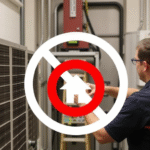
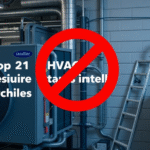
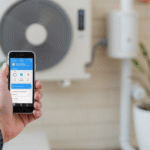
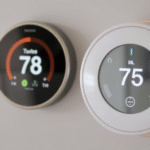
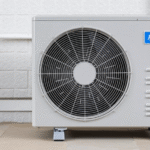
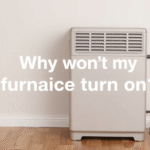
Leave a Reply